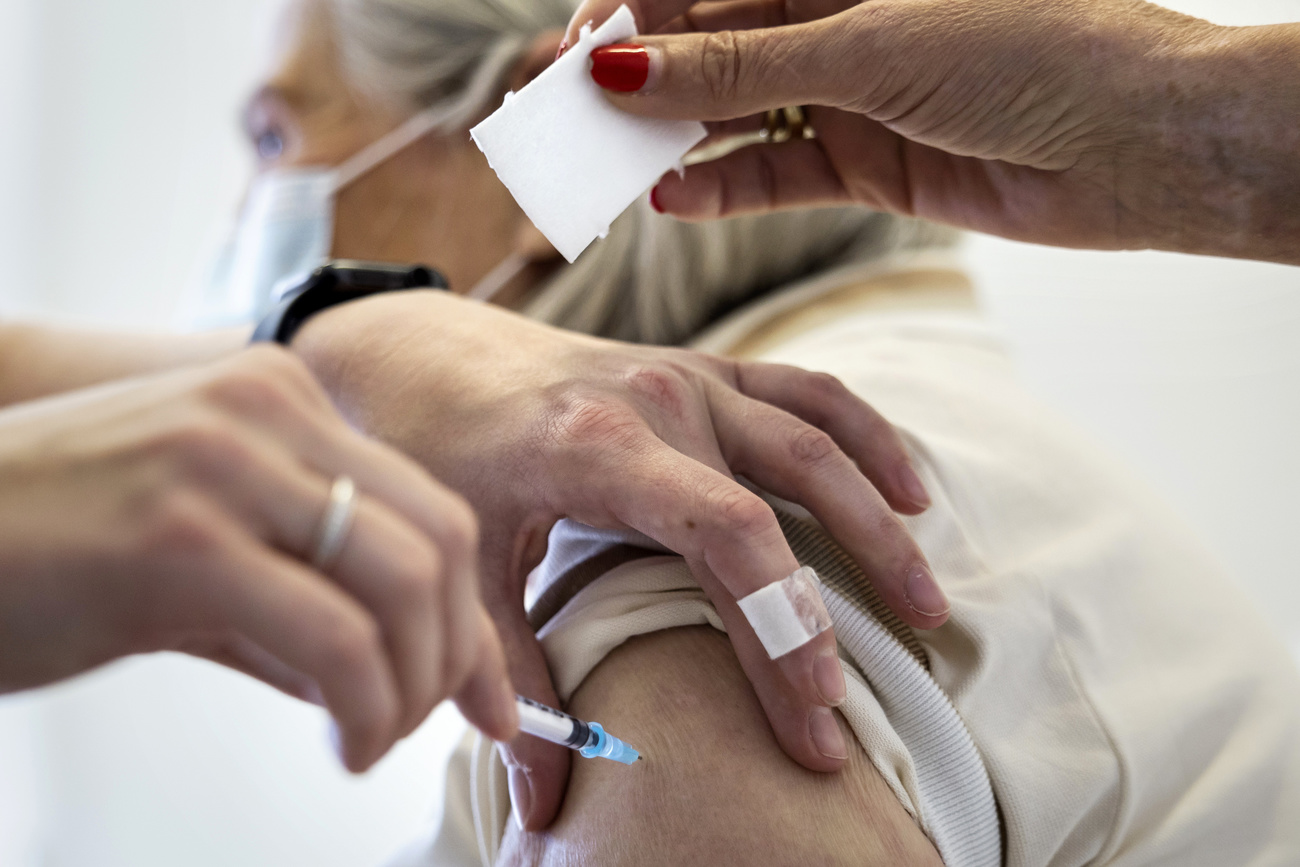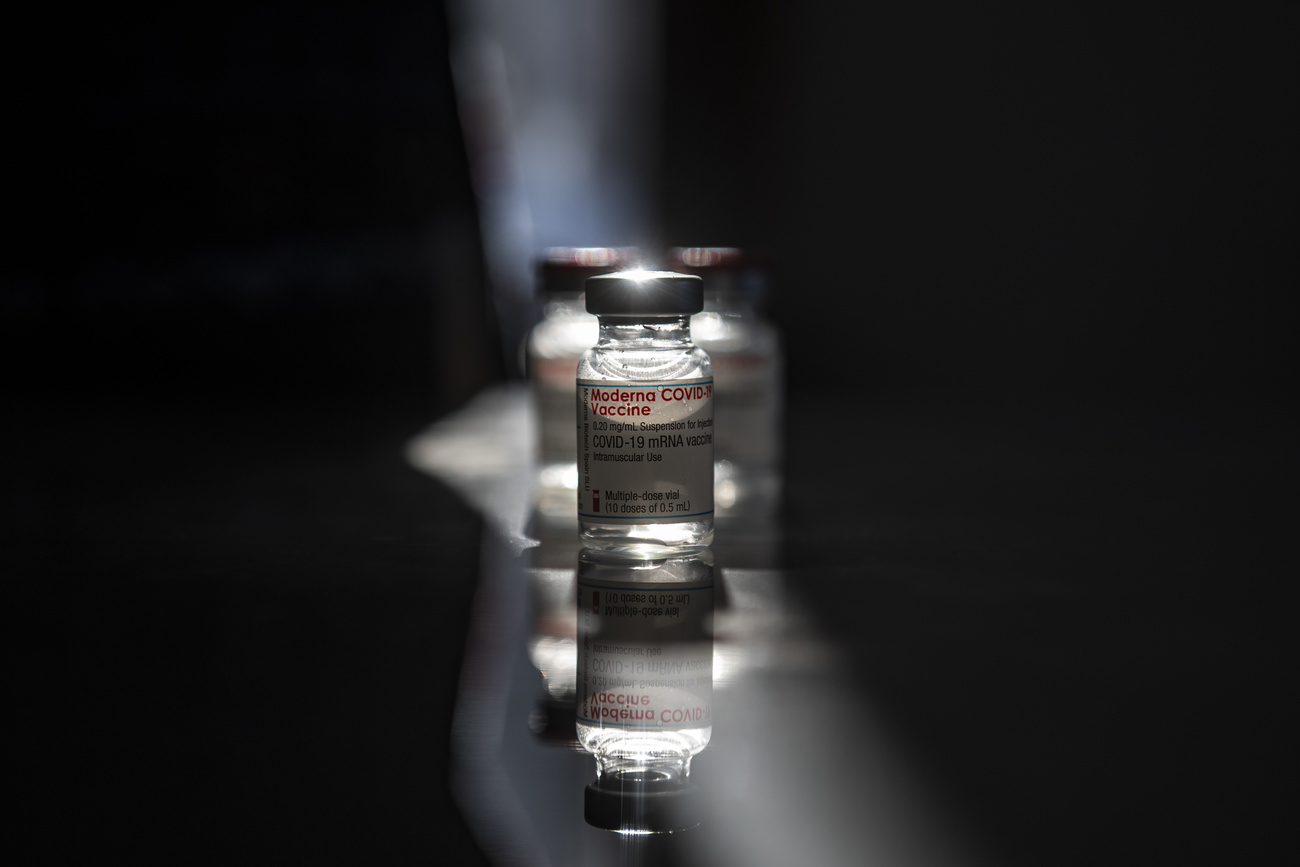
Coronavirus: the situation in Switzerland

An overview of the latest Covid-related information in the Alpine nation.
- Covid-19 and other respiratory viruses are circulating again in Switzerland and putting hospitals under pressure. Switzerland is in the midst of a strong Covid-19 wave, according to the Federal Office of Public Health (FOPH). SARS-CoV2 is currently circulating the most widely in Switzerland, followed by rhinoviruses, RS viruses and influenza, the FOPH told Keystone-ATS news agency on December 13.
- The Federal Office of Public Health (FOPH) and the Federal Commission for Vaccinations (FCV) recommend that vulnerable people get vaccinated against Covid-19 this autumn/winter. This includes people over 65, those aged 16 and over with a pre-existing illness or Down syndrome, and pregnant women with a pre-existing illness. The coronavirus continues to circulate and can cause a severe form of Covid-19 in vulnerable people, they said on September 11. No official vaccination recommendations are made for other groups of people. In the absence of risk factors, the probability of developing a serious form of the disease is low, FOPH says. However, vaccination is still possible against payment.
- A highly mutated Covid variant called BA.2.86 is being closely monitored by the World Health Organization (WHO) after having been detected in wastewater in Switzerland and a handful of other countries, it was announced on August 25. Scientists around the world said while it was important to monitor BA.2.86, numbers are low and it was unlikely to cause a devastating wave of severe disease and death given immune defenses built up worldwide from vaccination and prior infection.
- Switzerland will no longer issue or verify Covid-19 certificates from September 2023, the government said on August 16. The system and its technical infrastructure will cease to operate at the end of August. This decision is linked to the expiration of the legal basis for the European Union’s digital Covid certificate at the end of June and in view of the stable epidemiological situation, the authorities said.
- The number of new lab-confirmed Covid infections fell considerably after federal authorities stopped covering the costs of tests on January 1, 2023. The FOPH said it expected to see a “corresponding reduction in the volumes of tests conducted and increases in the estimated numbers of unrecorded cases”.
- Consequently, SWI has decided to no longer provide an update of weekly Covid infections or related graphics until further notice. For more information on the latest Covid statistics in Switzerland, please consult the FOPH site “COVID-19 Switzerland”.
- All remaining Covid prevention measures were lifted on April 1, 2022. Masks are no longer required on public transport, and there is no more five-day isolation requirement for positive cases. Health-related restrictions for incoming travelers were lifted in February 2022.
- More than 14,100 people have died in connection with Covid-19 in Switzerland, which has a population of 8.7 million.
- Around 69% of the population has received two doses of vaccine.
What’s the virus situation?
Covid-19 and other respiratory viruses are circulating again in Switzerland and putting hospitals under pressure it was reported in December. Switzerland is in the midst of a strong Covid-19 wave, according to the Federal Office of Public Health. SARS-CoV2 is currently circulating the most widely in Switzerland, followed by rhinoviruses, RS viruses and influenza, the FOPH told Keystone-ATS news agency on December 13.
After summer 2023, Covid infections and hospitalisations started rising in the United States, Europe and Asia but well below previous peaks.
“Compared to the pandemic years 2020 and 2021, the situation has changed significantly: among people under 65 who do not have risk factors, the probability of a serious form of Covid-19 is minimal,” saidExternal link the FOPH on September 11. However, among vulnerable people, the risk is significantly higher.
FOPH says that new variants currently in circulation present new mutations which allow them to partially escape the immunity acquired by the population. In addition, the protection afforded by vaccination (or previous infection) gradually diminishes over time. Due to these two factors, to which will be added increased contact in indoor spaces, the FOPH and the CFV expect an increase in the number of infections this fall and winter.
The number of new lab-confirmed cases fell considerably from the start of 2023 when federal authorities stopped covering the costs of tests. Since April 2022 the Federal Office of Public Health (FOPH) has been communicating Covid statistics only once a week. Delays in data transmission and retroactive corrections may explain some discrepancies in the figures.
Around 97% of the Swiss population (8.7 million) have developed antibodies against the virus via vaccination or infection. However, the long-term consequences of the pandemic, so-called long Covid, continue to cause concern. The main reported long Covid symptoms are fatigue, mental stress, shortness of breath, loss of taste and smell, concentration and memory problems as well as chest or other pains.
Longer-term, the coronavirus will most likely not disappear, the government has said, but become endemic with seasonal waves likely in future.
Latest health measures
Since April 1, 2022, there have been no pandemic restrictions in Switzerland. On March 30, 2022, the government announced that the last remaining measures would be dropped, specifically the mask requirement in public transport and health facilities, and the mandatory five-day isolation requirement after a positive test.
Since February 17, 2022, people no longer have to show a Covid certificate to enter bars, restaurants and other indoor venues such as sports facilities, theatres or concert halls. There are also no further restrictions on the size of private gatherings, while large events no longer have to apply for authorisation.
Switzerland will no longer issue or verify Covid-19 certificates from September 2023, the government said on August 16. The system and its technical infrastructure will cease to operate at the end of August. This decision is linked to the expiration of the legal basis for the European Union’s digital Covid certificate at the end of June and in view of the stable epidemiological situation, the authorities said.
Responsibility for containing the virus has been handed over to cantonal authorities.
Vaccination and treatment
The FOPH and the Federal Commission for Vaccinations (FCV) recommend that vulnerable people get vaccinated against Covid-19 for autumn/winter 2023. This includes people over 65, those aged 16 and over with a pre-existing illness or Down syndrome, and pregnant women with a pre-existing illness. Ideally, vaccination should be carried out between mid-October and December 2023. The cantons will inform individually about the available offer.
No official vaccination recommendations are made for other groups of people. In the absence of risk factors, the probability of developing a serious form of the disease is low, FOPH says. However, vaccination is still possible against payment.
Vaccination against Covid-19 consists of a single dose of vaccine, which can be administered no earlier than six months after the last dose or last known infection.
The CFV and the FOPH preferably recommend the use of an mRNA or protein-based vaccine adapted to the XBB.1.5 variant. They assume that these products also protect well against severe forms of Covid-19 that can be caused by the variants currently in circulation.
These vaccines are in the process of being authorized by the Swiss Institute for Therapeutic Products (Swissmedic).
Around 69% of the population have been fully vaccinated (two doses) since the start of the pandemic.
Travel to and from Switzerland
On May 2, 2022, Switzerland lifted all remaining Covid-related entry requirements for travelers entering the country, regardless of country of origin.
Since February 17, 2022, health-related measures for people entering the country have also been lifted. It is no longer necessary to provide proof of vaccination, recovery or a negative test, or to complete an entry form.
The official government Travelcheck programme and the SEM website have detailed information on who is allowed to enter Switzerland and under which conditions. The FOPH also provides up-to-date information.
Swiss travelers planning to go abroad are advised to check entry conditions in their destination country or region.
Where can I find further information on the implications of Covid-19?
SWI swissinfo.ch is keeping this story updated regularly with numbers of confirmed cases and deaths, as well as any new significant measures taken by the cantonal and federal authorities.
Unfortunately, we cannot research and answer individual questions. Please check the following official federal websites for the most accurate and up-to-date information.
Infoline for people travelling to Switzerland: +41 58 464 44 88 (6am–11pm)
The State Secretariat for MigrationExternal link: updated information on the situation at Swiss borders, with a helpline to answer questions about reasons for the refusal of entry into Switzerland and exceptions.
The Swiss foreign ministryExternal link: information in French, German and Italian about the situation regarding foreign travel and the steps to be followed by Swiss citizens going abroad.
The Federal Office of Public Health (FOPH)External link: live updates of the national situation, as well as recommendations, public safety measures, and details of upcoming announcements.
The World Health Organization (WHO)External link: information on the origins and nature of Covid-19, as well as the global situation and travel advice.
Johns Hopkins UniversityExternal link: a global map that tracks the number of cases and fatalities by country.
Follow SWI swissinfo.ch on FacebookExternal link, and on X, formerly known as TwitterExternal link, for timely updates on the situation in Switzerland.

More
Covid-19 booster shots available to Swiss residents

More
Explainer: How ready is Switzerland for a new wave of Covid-19?

In compliance with the JTI standards
More: SWI swissinfo.ch certified by the Journalism Trust Initiative






























You can find an overview of ongoing debates with our journalists here . Please join us!
If you want to start a conversation about a topic raised in this article or want to report factual errors, email us at english@swissinfo.ch.